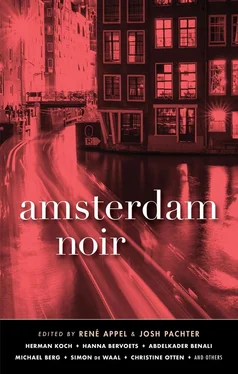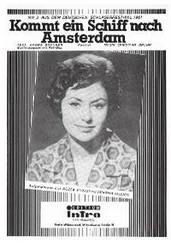Герман Кох - Amsterdam Noir
Здесь есть возможность читать онлайн «Герман Кох - Amsterdam Noir» весь текст электронной книги совершенно бесплатно (целиком полную версию без сокращений). В некоторых случаях можно слушать аудио, скачать через торрент в формате fb2 и присутствует краткое содержание. Город: New York, Год выпуска: 2018, ISBN: 2018, Издательство: Akashic Books, Жанр: Детектив, на английском языке. Описание произведения, (предисловие) а так же отзывы посетителей доступны на портале библиотеки ЛибКат.
- Название:Amsterdam Noir
- Автор:
- Издательство:Akashic Books
- Жанр:
- Год:2018
- Город:New York
- ISBN:978-1-61775-685-6
- Рейтинг книги:4 / 5. Голосов: 1
-
Избранное:Добавить в избранное
- Отзывы:
-
Ваша оценка:
- 80
- 1
- 2
- 3
- 4
- 5
Amsterdam Noir: краткое содержание, описание и аннотация
Предлагаем к чтению аннотацию, описание, краткое содержание или предисловие (зависит от того, что написал сам автор книги «Amsterdam Noir»). Если вы не нашли необходимую информацию о книге — напишите в комментариях, мы постараемся отыскать её.
Amsterdam Noir — читать онлайн бесплатно полную книгу (весь текст) целиком
Ниже представлен текст книги, разбитый по страницам. Система сохранения места последней прочитанной страницы, позволяет с удобством читать онлайн бесплатно книгу «Amsterdam Noir», без необходимости каждый раз заново искать на чём Вы остановились. Поставьте закладку, и сможете в любой момент перейти на страницу, на которой закончили чтение.
Интервал:
Закладка:
The bus stood outside her door for ten minutes that morning, two wheels up on the curb. When she couldn’t calm Johnny down, she bribed him with a prepackaged pancake. It was much too early for a treat — she could see Johnny’s nutritionist shake a finger — but what choice did she have? The bus was waiting, with other children aboard. Thank god Johnny stopped screaming the moment he heard the crinkle of the plastic wrapper.
“Sorry,” she told the frowning driver, when Johnny finally clambered up into the bus.
Later that day, she regretted the humbleness of her apology. She did what she could, damn it, and who was a school-bus driver to judge her? She wished she’d told him so, right to his face. But at the same time she felt guilty about the way she’d treated Johnny. She shouldn’t have insisted on the rain jacket. He was tired, he’d had a bad night, his day hadn’t even begun, and she was already nagging him. When she brought him home from Mireille’s that evening, she decided, she’d give him another pancake, just because.
Had she noticed Femke come into the café that morning?
Probably not. She can barely recall taking her order — the only reason she knows now that it had been an open-faced egg sandwich was that she remembers Femke saying, “You should leave off the dill,” when she paid for it. A typical remark, she would come to learn: Femke always spoke her mind, whether or not anyone had asked for her opinion. At first, Gita saw the trait as arrogance, until she realized that in a way it came from a desire to be helpful. Femke simply knew better than most other people, and with each observation about the things she ate and saw and did, Gita’s admiration for Femke’s knowledge and insight and pure bravado grew.
After the comment about the egg sandwich, though, Gita had merely nodded. She’s not from around here , she thought. She could tell from the woman’s long, formfitting raincoat, nothing like the shapeless things worn by the café’s usual customers. Before heading back out into the rain, Femke had tightened her belt, but Gita didn’t notice how slim she was until later that day, when the woman returned. Her raincoat was dry then, and so elegant that Gita wondered if it really was a raincoat, after all.
“I think I left my gloves here,” Femke said.
Now that they were standing face-to-face, Gita realized that the woman was beautiful. Maybe it was her makeup, she thought at the time. But four or five weeks later, Femke gave her an eyeliner pencil, the same kind she used herself, and it didn’t make Gita’s eyes any bigger or more attractive.
“I don’t think we found a pair of gloves,” said Gita, and she glanced at Sjors, who stood in the doorway to the kitchen, shaking his head.
Femke shrugged. “Might as well have a drink, since I’m here. Do you carry Macallan?”
She spent the rest of the afternoon at the bar, reading the newspaper, playing with her phone, asking questions whenever Gita had a free moment. About the café — “You didn’t have to close when they renovated the square?” — but personal things too: “Do you live in the neighborhood?”
Gita remembers finding their on-and-off conversation odd, but not unwelcome. When customers talked to her, they were mostly older gentlemen who did little more than order another drink. Femke was young — probably ten years younger than Gita — a member of a more interested generation. So when she suggested that Gita pour one for herself, Gita did something she’d never done before. She set a shot glass on the bar beside the register and filled it to the rim with whiskey.
She hadn’t had much to eat that afternoon. The guilty residue from the morning’s scene with Johnny stuck to her ribs like chewing gum, but the whiskey burned some of it away and gave her the courage to speak honestly for once. “Actually,” she heard herself say, “I don’t like the neighborhood as much as I used to. They promised us a whole new clientele after the renovation. But most of our regulars moved away, and we’re not good enough for the new residents. They like the trendy spots in the Van der Pekstraat, little bistros that serve soup, where the whole menu is soup and nothing but soup, you know what I mean? Can you believe anyone would come all the way up here to eat soup?”
Femke toasted her and sipped her whiskey.
Encouraged, Gita went on: “All those chichi places are the same: a brick wall, ferns, folding chairs, a wooden bar; it’s like you’re in a house that’s in the middle of being remodeled. They serve your drink in a mason jar instead of a normal glass, but it’s not like those jars ever actually held pears or peaches or whatever, they buy them brand new by the case. Did you ever try to drink out of one of those things? You’re lucky if you don’t spill all over yourself!”
Femke laughed and shook her head. “I’ll drink to that!” She emptied her glass in one swallow and leaned across the bar, her face only inches from Gita’s. Her heavy perfume reminded Gita of her father’s aftershave, with just a hint of Gauloises mixed in.
“We should go to one of those hip places sometime,” Femke whispered conspiratorially, “and sabotage the joint.”
Gita laughed, not sure if Femke was serious, too tipsy from her drink to come up with a witty response.
Femke rose from her stool and picked up her phone. “I’ll text you so you can let me know if my gloves turn up. What’s your number?”
Gita told her. It seemed natural but at the same time not, as if she’d eaten a piece of candy of a type she hadn’t tasted in years. When was the last time anyone had asked her for her phone number?
When she got to Mireille’s that evening, Johnny was parked in front of the TV. She’d hurried up the six flights of stairs and stood panting in the quiet living room; the ticking of the cuckoo clock was an almost sarcastic echo of her heartbeat. Johnny was watching Elmo. It was his favorite DVD, though Gita wished he would pick something else for a change. Elmo reminded her that Johnny never made any progress, which reminded her in turn that she never made any progress, trapped in a stuffy room where the light was always blue and Elmo endlessly showed off his brand-new shoes.
Mireille slouched in her armchair by the window, paging through a magazine.
“Sorry I’m so late,” said Gita.
“You couldn’t call?” Mireille snapped, not looking up. “Johnny was worried about you.” She nodded at the television: Johnny was glued to the screen, his mouth slightly open, as if this was the first time he’d ever seen Elmo’s big red feet. “I do this for you, you know,” Mireille muttered, struggling to her own feet. “You want Earl Grey or rose hip?”
Whiskey , Gita thought. Do you carry Macallan?
That Friday evening, Johnny had splashed merrily in the tub, teasing her. She’d found the game tiring, but she’d played along: “Come on, I bet you can’t get me wet!” She was mopping the bathroom floor with a towel when her phone buzzed in her hip pocket. A text. She had to scroll up to see who had sent it, and what she found, from four days earlier, was Femke’s number and Red leather gloves!
This new message read: Sabotage the Soepboer on Sunday?
Gita stuffed the phone back in her pocket, as if she’d been caught looking at something not intended for her eyes.
She got to the Soepboer a little early. She’d dropped Johnny off at Mireille’s with the excuse that she’d been asked at the last minute to work an extra shift at the café, and then she hurried down the Van der Pekstraat more quickly than necessary, perhaps motivated by her lie, which had made it sound like she was in a rush. She wore her tightest jeans but worried her age would be a giveaway that the Soepboer wasn’t her type of place. The moment she came through the door, someone called her name: Femke, already seated at a little table by the window.
Читать дальшеИнтервал:
Закладка:
Похожие книги на «Amsterdam Noir»
Представляем Вашему вниманию похожие книги на «Amsterdam Noir» списком для выбора. Мы отобрали схожую по названию и смыслу литературу в надежде предоставить читателям больше вариантов отыскать новые, интересные, ещё непрочитанные произведения.
Обсуждение, отзывы о книге «Amsterdam Noir» и просто собственные мнения читателей. Оставьте ваши комментарии, напишите, что Вы думаете о произведении, его смысле или главных героях. Укажите что конкретно понравилось, а что нет, и почему Вы так считаете.












